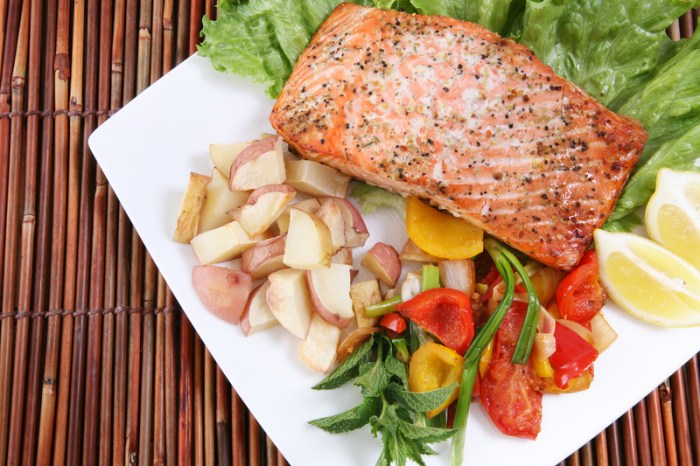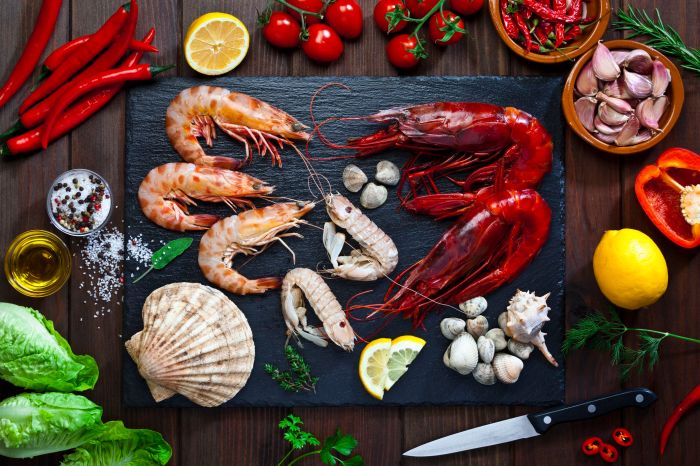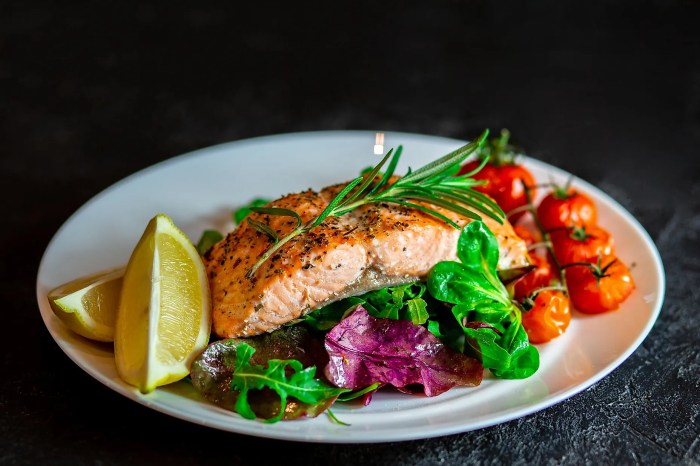Embarking on the pescatarian lifestyle, a unique dietary approach that incorporates seafood while excluding other meats, unveils a world of health, environmental, and ethical advantages. As we delve into the nuances of this dietary choice, we’ll explore its multifaceted benefits and considerations, empowering you to make informed decisions about your dietary journey.
The second paragraph delves into the specific health benefits associated with a pescatarian diet, highlighting the role of omega-3 fatty acids in promoting heart and brain health, supported by credible scientific evidence.
Definition of Pescatarian Lifestyle

A pescatarian diet is a type of semi-vegetarian diet that includes fish and other seafood but excludes meat and poultry. Pescatarians typically consume a variety of plant-based foods, such as fruits, vegetables, whole grains, and legumes, along with fish and other seafood.
This diet is considered a healthier alternative to a traditional meat-based diet, as it provides many of the same nutrients without the saturated fat and cholesterol found in meat.
Difference between Pescatarians and Vegetarians/Vegans
Pescatarians differ from vegetarians in that they consume fish and other seafood, while vegetarians abstain from all animal products, including fish and seafood. Pescatarians also differ from vegans, who abstain from all animal products, including fish, seafood, eggs, dairy products, and honey.
If you’re looking to incorporate more seafood into your diet, a pescatarian meal plan week might be the perfect way to start. Pescatarians abstain from eating meat but include fish and other seafood in their diet. This meal plan provides a variety of recipes for breakfast, lunch, dinner, and snacks that are both delicious and nutritious.
You can find a pescatarian meal plan week that includes recipes for every meal of the day.
Health Benefits of a Pescatarian Lifestyle
Adopting a pescatarian diet offers numerous health benefits due to its nutrient-rich composition. Studies have consistently demonstrated the positive impact of this dietary pattern on various aspects of health, including heart health, brain function, and overall well-being.
Omega-3 Fatty Acids
Pescatarian diets are particularly rich in omega-3 fatty acids, essential nutrients that play crucial roles in maintaining optimal health. These fatty acids have been extensively researched for their beneficial effects on heart health and brain function.
Heart Health
- Omega-3 fatty acids have been shown to reduce the risk of heart disease by lowering blood pressure, improving cholesterol levels, and reducing inflammation.
- They may also help prevent the formation of blood clots and improve the function of the heart muscle.
Brain Function
- Omega-3 fatty acids are essential for brain development and function.
- They have been linked to improved cognitive function, reduced risk of dementia, and protection against age-related brain decline.
Environmental Impact of a Pescatarian Lifestyle

Adopting a pescatarian lifestyle can have significant environmental benefits. Reducing meat consumption, particularly red meat, can help mitigate climate change and protect ecosystems.
Impact of Reduced Meat Consumption, Pescatarian lifestyle
- Meat production contributes to greenhouse gas emissions, primarily methane and nitrous oxide. Reducing meat intake can help lower these emissions.
- Animal agriculture requires vast amounts of land, water, and feed, which can lead to deforestation, water scarcity, and pollution.
Impact of Fish Farming
While fish consumption is generally more sustainable than meat consumption, fish farming can have negative impacts on marine ecosystems.
- Fish farms can release waste and chemicals into the surrounding water, leading to pollution and eutrophication.
- Farmed fish can escape and interbreed with wild populations, potentially altering their genetic diversity and survival.
Practical Considerations for a Pescatarian Lifestyle

Adopting a pescatarian lifestyle requires thoughtful planning and preparation. Here are some practical tips and resources to help you get started and maintain a healthy, sustainable pescatarian diet.
Meal Planning and Recipes
Creating a balanced and satisfying pescatarian meal plan is essential. Consider the following tips:
- Incorporate variety:Include different types of fish and seafood, such as salmon, tuna, sardines, and mussels, to ensure a diverse intake of nutrients.
- Focus on plant-based foods:Fruits, vegetables, legumes, and whole grains should form the foundation of your diet, providing fiber, vitamins, and minerals.
- Plan meals ahead:This will help you avoid impulsive choices and ensure you have healthy options available.
Numerous resources are available to provide inspiration and guidance for pescatarian meal planning, including:
- Websites:Forks Over Knives, Plant-Based on a Budget, and The Pescatarian Kitchen offer recipes, meal plans, and tips.
- Cookbooks:“The Pescatarian Cookbook” by Alissa Segersten and “The Ultimate Pescatarian Cookbook” by Kathy Hester provide a wide range of delicious and nutritious recipes.
Challenges and Drawbacks
While a pescatarian lifestyle offers many benefits, it also presents some challenges:
- Limited protein sources:Pescatarians rely primarily on fish and seafood for protein, which may require careful planning to ensure adequate intake.
- Omega-3 fatty acid deficiency:Some types of fish are high in omega-3 fatty acids, but others are not. Pescatarians may need to supplement their diet or choose fish high in omega-3s, such as salmon or tuna.
- Social situations:Attending social events where non-pescatarian options are the norm can be challenging. Politely decline or bring your own pescatarian-friendly dishes.
It’s important to note that these challenges can be overcome with careful planning and preparation. By embracing the practical considerations Artikeld above, you can enjoy the health benefits and sustainability of a pescatarian lifestyle.
Cultural and Ethical Aspects of a Pescatarian Lifestyle
Pescatarianism, as a dietary practice that includes seafood while excluding other meat sources, has been influenced by various cultural and religious factors throughout history. Many cultures, particularly those with coastal or island communities, have traditionally incorporated seafood into their diets as a primary source of protein and nutrients.
Pescatarianism is a diet that includes fish and other seafood but excludes meat and poultry. If you’re looking to try a pescatarian meal plan, a sample pescatarian meal plan week can help you get started.
Religious beliefs, such as those observed in certain Buddhist and Hindu traditions, may also promote a pescatarian lifestyle due to the emphasis on non-violence and compassion towards animals.
Ethical Considerations
The ethical implications of seafood consumption are a significant aspect of a pescatarian lifestyle. Concerns about the welfare of marine animals, particularly in the context of industrial fishing practices, have raised ethical questions among pescatarians. Overfishing, bycatch (the unintended capture of non-target species), and habitat destruction pose significant threats to marine ecosystems and biodiversity.
As a result, many pescatarians prioritize the consumption of sustainably sourced seafood, supporting fisheries that employ ethical and environmentally responsible practices.
Conclusive Thoughts
In conclusion, the pescatarian lifestyle offers a compelling balance of health, environmental sustainability, and ethical considerations. By incorporating seafood into a plant-based diet, individuals can reap the benefits of both worlds, contributing to their well-being, the planet’s health, and the ethical treatment of animals.
FAQ Resource: Pescatarian Lifestyle
What is the main difference between a pescatarian and a vegetarian?
Pescatarians include seafood in their diet, while vegetarians exclude all animal products, including fish and seafood.
Are there any potential drawbacks to a pescatarian lifestyle?
As with any dietary change, it’s important to ensure adequate intake of essential nutrients, such as vitamin B12, which is primarily found in animal products. Consulting with a healthcare professional or registered dietitian can help address any potential concerns.
How can I incorporate more seafood into my pescatarian diet?
Explore a variety of seafood options, such as fatty fish like salmon, tuna, and mackerel, which are rich in omega-3 fatty acids. Consider incorporating seafood into salads, pasta dishes, soups, and grilled meals.